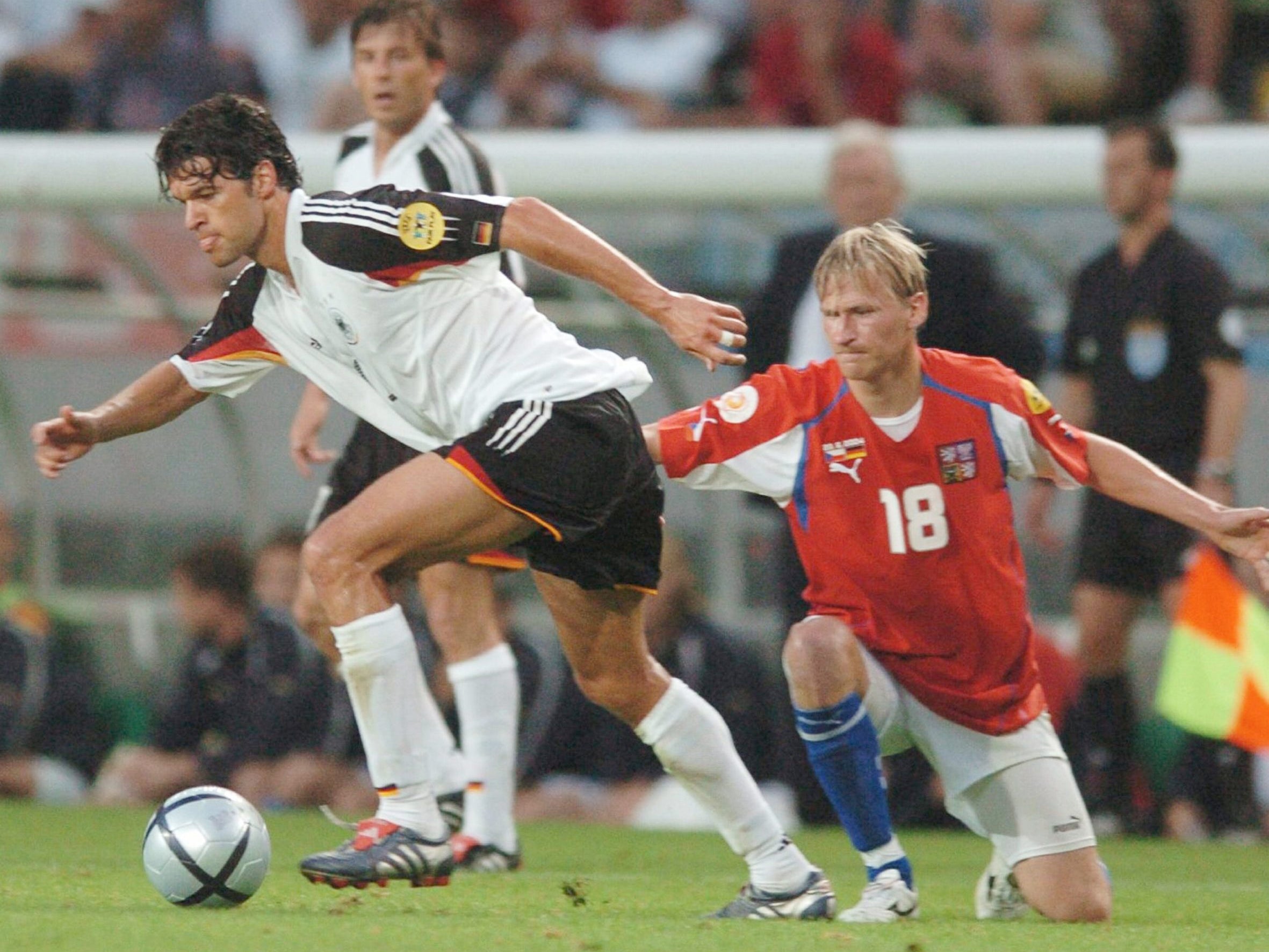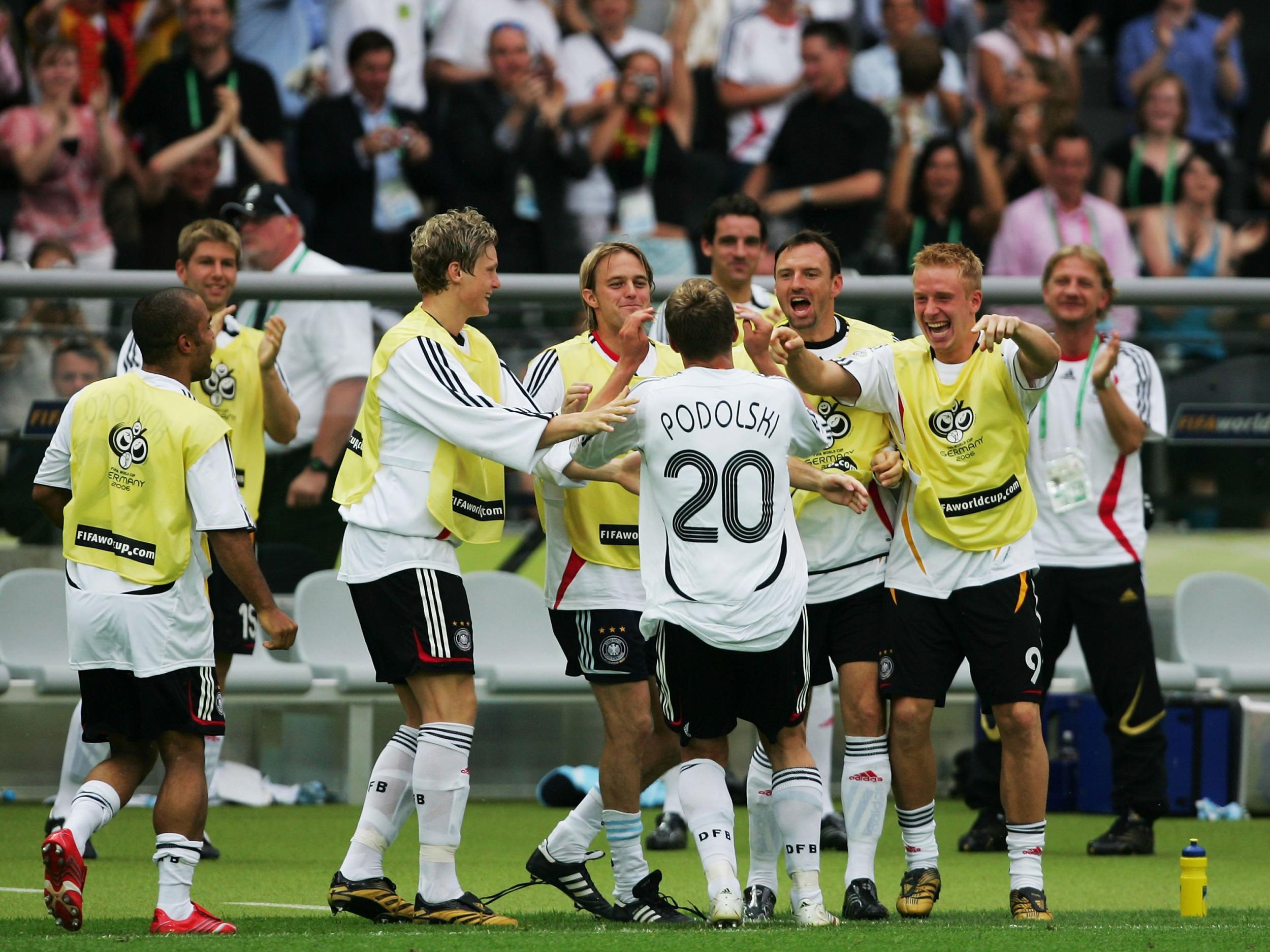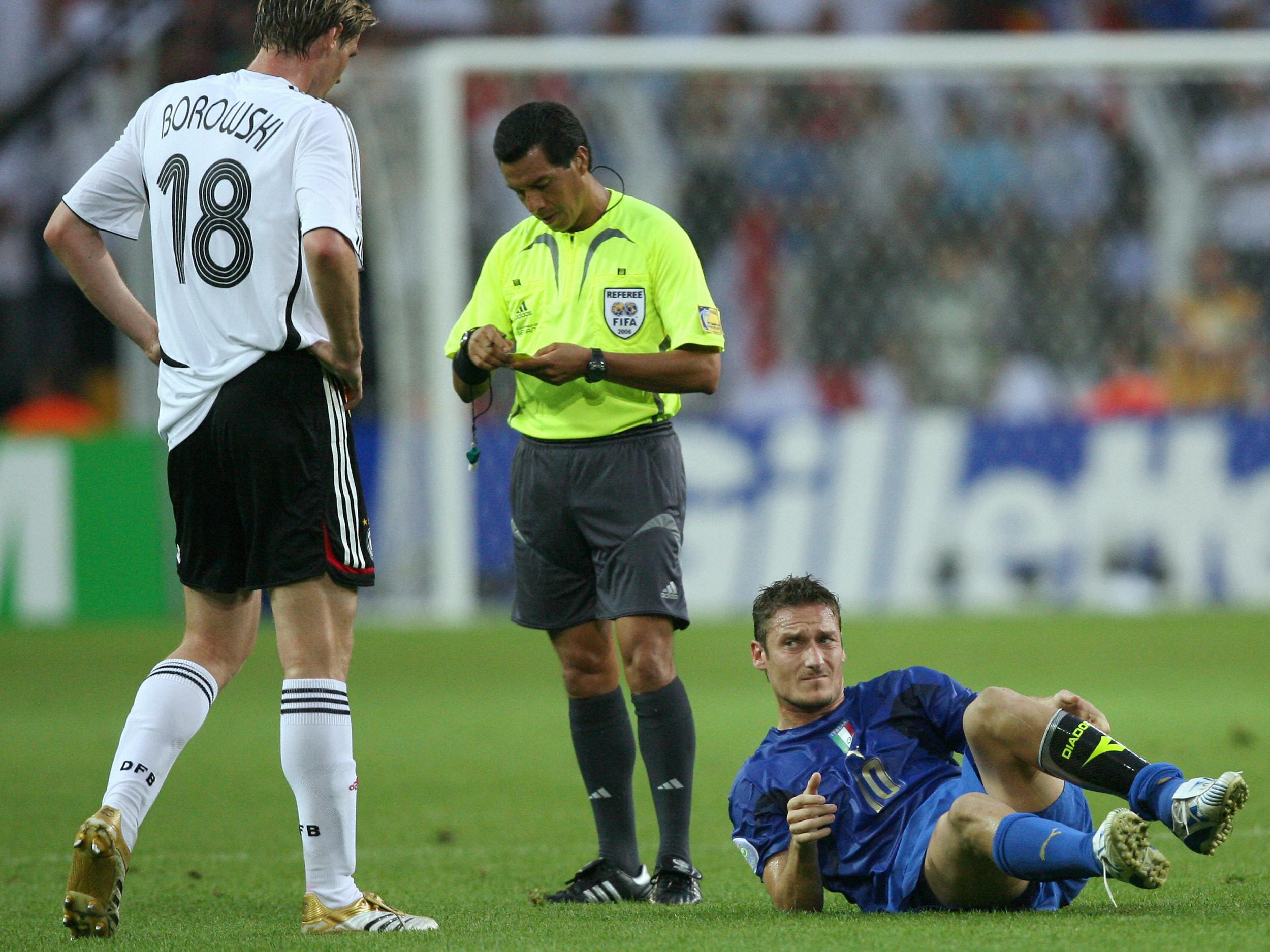World Cup 2018: Tim Borowski recalls 2006 Germany semi-final heartache and his relationship with Jurgen Klinsmann
Borowski started against Italy for the Dortmund semi-final and admits that had he not played, Germany would have won.
Whenever Tim Borowski had a day off, he would hire a car, drive from the Germany national team hotel in the Berlin suburb of Grunewald, into the middle of the city. He would go to his favourite café on the Kurfürstendamm, get a double espresso and a cake, taking the city and the people into his heart.
Borowski is hard to miss – almost 6 foot 5 – but he had some privacy there, sat behind the café window. “I would watch all the people,” he remembers, 12 years on. “But they would not see me. And I take with me the eyes from all the guys [in the Germany team]. It was perfect.”
Because this was one of the most important moments in modern German sport and modern German life. The World Cup, Germany’s first major event post reunification, was an organisational triumph. The team played engaging, expansive ambitious football and reached the semi-finals. But most important of all was the swell of public support behind them. This team changed the mood of the nation, and in doing so they changed Germany forever.
“There was a fever for this team,” Borowski looks back. “Everybody put the German flags outside, on their cars, on their flats.” That might not sound like much but then Germany had been anxious and wary about any public displays of patriotism for the past 60 years. It was only in the buzz of that summer, the team and their famous wins – Costa Rica, Poland, Ecuador, Sweden and Argentina – that they opened something they had denied themselves before. Patriotism was detoxified.
“It was important,” Borowski says. “It was ok if you put your flag outside. Because you know our bad history, and in the time before the World Cup, nobody wanted to do that. Because some guys might say ‘hey, what are you doing, don’t you know our history?’ But [in 2006] they are proud to be here. They are proud to live in Germany. They are proud of the team.”
Of course Berlin was at the heart of all this. The reunified capital of the reunified country was filled for this sunny month with football fans, watching the games in their tens of thousands on screens at organised ‘Public Viewings’, making images that went round the world.
The fact that the team were based outside Berlin – and that Borowski could go and have his coffee and cake on the Kurfürstendamm – was no accident. It was one of the many far-sighted decisions taken by coach Jurgen Klinsmann and general manager Oliver Bierhoff in the run-up to the tournament: to wrap their team in their public as tightly as possible, each inspiring the other to believe even more.
The DFB’s initial plan was for the German team to train at Bayer Leverkusen’s facility, and to stay a long bus ride away in Bergisch Gladbach. “That was the first plan,” says Borowski. “But the best plan was Berlin.”
Klinsmann had been to six international tournaments as a player so knew the benefit of not being cooped up remotely away from real life. “Klinsmann said he was a long time a national team player, 108 games, and he always stayed in small football schools [training camps],” Borowski says. “If you’re five or six weeks together, always in the small football schools, you go crazy. Team-work is much better when you have some time for yourself, an hour or two. You can rent a car, and see everything that happens in the city. See the people, and get it into your heart.”

None of this would have been possible were it not for the disaster of Euro 2004, when Germany went home at the group stage, drawing with Latvia, losing to Czech Republic, and playing the old, tired, staid football they feared was their future. That was when the DFB took the risk of appointing Klinsmann, who promised to revolutionise German football, even though he had little coaching experience and lived in California. “Euro 2004 was not acceptable,” Borowski says. “So the DFB changed a lot of things, and one of the most important things for the next 20 years was to install Jurgen Klinsmann. Because he had the helicopter view, and saw everything: what is very good, what is good, and what is not so good. He changed the philosophy, the youth academy, the daily training sessions, and started a new era.”
More than anything else, Klinsmann had to convince the players that they could win again. “He had the mentality to win every game,” Borowski says. “He influenced us every day, every day, every day. He caught us with his words.” His assistant, Joachim Loew, was the “tactical expert”. Swiss analyst Urs Siegenthaler, the third man on the team, was “a great guy” and popular with the players for his meticulous scouting and opposition work. The staff hammered the players with one message: trying to win was not enough, they have to believe that they would.
But when the players went to Munich, to the brand new Allianz Arena, for the opening game, they still had to cope with that heavy pressure of national doubt. And that sense you get at the start of any great endeavour of having no real idea how good you might be.
“This was a strange game, like the first game of a new season,” remembers Borowski, who started because Michael Ballack was injured. “You are in good shape, everybody is happy, everybody focused, everybody wants to win. But you don’t know where you are, actually. One billion people saw the game. It was 35 degrees in shadow. It was a really tough game for us, from the mental side.” Germany won 4-2, entertaining but not convincing, not yet.
This was still a learning process for the team as well as for the public. And it was only their second game, against Poland in Dortmund, when that belief became real. Germany were struggling, frustrated by the Polish defence, but they won the game in added time: David Odonkor’s cross, Oliver Neuville’s header and an explosion of noise that catalysed the faith of the German team and public.
“This was, I think, for the whole tournament, the most important game,” says Borowski. “Germany and Poland is not always the best friendship in football, maybe from our bad history. It was 0-0, to the last minute, and we tried to score the goal, try, try, try. Odonkor’s cross, Oli scored and 85,000 people in the stadium went crazy. For us, it was very important to get to the new level, of belief. Then, we knew exactly: OK, we can go, we can go, we can go.”
That was the moment that changed finally the national mood. “It was amazing,” Borowski remembers. “You saw in every game, there were 80,000 people for Germany and maybe 6,000 or 8,000 for the other team. It was brilliant. You saw the game against Poland. Or the game against Argentina. It was amazing. Nice weather. Good stadiums. Modern stadiums. Good people. No stress. And a lot of supporters.”
Riding that wave of public support and euphoria, Germany blew Ecuador away 3-0 in their third game and then went back to Munich and beat Sweden 2-0 in the last 16. Then to Berlin, for the quarter-final with Argentina, the early favourites who had scored one of the great World Cup goals in their 6-0 win over Serbia and Montenegro.
Argentina arrived in Berlin with an arrogance that struck the Germans. “It started before the game,” Borowski remembers. “They got to the stadium on their coach and they were being provocative as they came in. The Argentina team was a little bit like…’we can beat Germany for sure’. Sometimes when you see the teams, as they come onto the pitch, you can see it, you can feel it. It’s the aura. You see every player showing the other team they are strong enough to beat you.”

Argentina started stronger and took the lead through a Roberto Ayala header. Late in the second half Borowski was thrown on for Bastian Schweinsteiger, and five minutes later he had turned the game around. “I saw from the left side, Michael Ballack got the ball, wanted to cross it,” he remembers. “It was a little bit short, I saw it, I remember Miro [Klose] ran behind me into the box, and I have to take the header to make the cross a little bit longer.” Borowski flicked the ball into Klose’s path and he nodded it in with 10 minutes left.
The mood changed instantly. “After the 1-1, we knew now it was time,” Borowski says. “We will beat you: in normal time, in extra-time or on penalties.” After 120 minutes, before penalties, the Argentina players started “trash talk” towards the Germans. But it did not put them off. Germany scored all four penalties, Borowski the fourth, putting into the bottom right after Germany’s psychology coach had told the players they had to tell their team-mates where to they were aiming before the kick. “It’s complex,” Borowksi says. “You need to be self-confident for sure. You need a good technique. And I think the main thing is you have to work against pressure. So you have to be focused. Breathe. And score.”
That pressure was too much for Argentina. Ayala and Esteban Cambiasso had kicks saved by Jens Lehmann and in bitter defeat, Argentina sparked a mass brawl. And that violence did more than anything else to stop Germany’s own progress: Torsten Frings, their anchor, punched Julio Cruz and while it was not seen he was spotted on video footage and banned.

So Borowski had to start against Italy for the Dortmund semi-final and even he admits that had he not played, Germany would have won. “I am sure, if Torsten Frings was not suspended, we would have won the World Cup, for sure,” he says. “But he was suspended in this game, it was a bad thing for us.”
Germany were still optimistic, they had been playing better than Italy, but without Frings they could never quite get a foothold in the game, and they did not take their early chances. “Italy had played a bad tournament,” Borowski says. “But their best game in the whole tournament was the semi-final. Not the final, not the quarter-final, but the semi-final. They played a very good game, it was a very intensive game We had to score one or two goals, with Bernd Schneider for example, but we didn’t.”
All that accumulated belief and all that momentum ultimately counted for nothing when, in the 119th minute, Pirlo worked a corner to Fabio Grosso who whipped the ball into the far corner of the net. One minute later Alessandro Del Piero made it 2-0. The great German train had come to a stop. “We felt like the tournament stopped,” Borowski admits. “Some guys were crying. We didn’t realise the situation. It was like getting killed by a knife to the heart.”
Italy, of course, went on to the Berlin final and beat France on penalties. Germany had to wait until Euro 2008 to reach a final and the 2014 World Cup to win one. But at home that hot summer they had proved a point. “I’m proud of the tournament because not only we made a lot of people in Germany happy and proud, but also the football world was impressed by the way Germany played this tournament ” Borowski reflects. They had taught themselves how to play, how to win and how to celebrate again.
Join our commenting forum
Join thought-provoking conversations, follow other Independent readers and see their replies
Comments
Bookmark popover
Removed from bookmarks